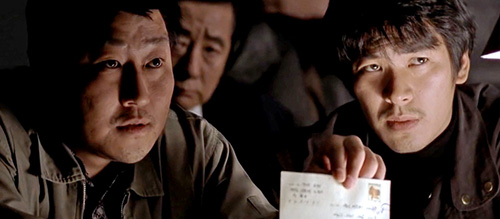Memories of Murder (2003) Review
Memories of Murder (2003)
Director: Bong Joon-ho
Screenwriters: Bong Joon-ho, Shim Sung-bo
Starring: Song Kang-ho, Kim Sang-kyung, Kim Roe-ha, Song Jae-ho, Byeon Hie-bong, Ko Seo-hie, Park No-shik, Park Hae-il
Before Bong Joon-ho received international attention with his 2006 monster-driven family drama The Host, and long before the game-changing awards juggernaut Parasite, he gave the world not only one of the finest murder-mysteries, but possibly one of the greatest Korean films of all time, Memories of Murder. Now the film has been digitally remastered in stunning 4k, you have the exciting opportunity to experience its dark majesty on the big screen or digitally at home.
In a re-telling of the police investigation into the gruesome Hwaseong Serial Murders committed between 1986 and 1991, we follow three mismatched detectives foiled by an elusive killer. Detective Park (Song Kang-ho) follows his misguided instincts to a fault and is prone to jumping to bizarre conclusions; Detective Cho (Kim Roe-ha) has a sadistic streak and is the first to resort to police torture to get a confession out of his suspects; Detective Seo (Kim Sang-kyung) is a newly transferred big city cop who conducts his investigations completely by-the-book and according to procedure. But with pressure on from their superiors and the press, and little hard evidence to go on, hair-brained theories and fabrication soon come into play as the killer continues to evade capture.
The film opens at a crime scene as Detective Park arrives to find a young woman’s body stuffed into a drainage pipe. Another murder is committed soon afterwards, and the investigators surmise that they are dealing with a serial killer from the almost identical state of the victims’ bodies, having been raped and tied up with their underwear. The only leads the police have are tenuous – the murderer appears to prefer to strike when it rains, the same love song has been requested and played on the radio just before each incident, and the women killed were each wearing red.
Bong Joon-ho is a true master of macabre humour. You’ll find it nigh-on impossible to find another example of police torture-based humour. He creates such unique and weird characters, and derives comedy from their quirks and clashes with others. He also plays on the incompetence of the Korean police force – one of the funniest scenes is the opening where every new cop or forensic scientist who arrives at a crime scene takes a tumble down a grassy bank, and then an unaware civilian drives a tractor straight over a crucial set of footprints. Another scene sees the detectives break off their round of violent interrogation to watch a cop show and eat noodles with their suspect.
Bong uses the 1980s setting to criticise his country’s authoritarian past. Quite aside from Detective Cho, and to a slightly lesser extent Park’s jackbooted methods of questioning suspects, their superiors in the police and the government they represent are shown to be ineffectual and corrupt time after time. They don’t really care who is found guilty of the murders, or even who really did it, as long as they have some result to present to the journalists baying for blood. They are clumsy and heavy-handed, and proven wrong at every turn. Students rioting against their oppressive government are shown to have a direct negative impact on the case – blackouts and defence drills provide the killer with ideal cover of darkness, and military suppression of protests means that the police are left short-handed at a critical point in the investigation.
The cast are uniformly excellent, but Song Kang-ho is the standout. He plays Park as a clown trying to get the right result using all the wrong methods. He’s a goofball but full of pathos, the tragedy that so many women meet such brutal ends because the police and the government they represent could not fulfil their duties is palpable. Seo is continually frustrated by the backwards policing methods at play, his straight-arrow morality beginning to slip as time runs out, and while Park seems to have more faith in the system because it’s the only one he’s ever worked in, even his relative optimism is overwhelmed and both he and Seo become haunted by their continued failure in the film’s final evocative stretch that comes drenched in dramatic rainfall.
Memories of Murder is bleak but also black humoured, and it vitally marked out Bong Joon-ho’s talent to marshal his casts and crews to perform at the very top of their games; to master tonal juxtaposition and hefty themes in the most arresting manner possible. He was always going to be a great filmmaker, and now the Academy and mainstream audiences worldwide have recognised that, his earlier work will inevitably see a resurgence in popularity and interest. It’s about damn time.
24/24
Recommended for you: Bong Joon-ho Films Ranked


